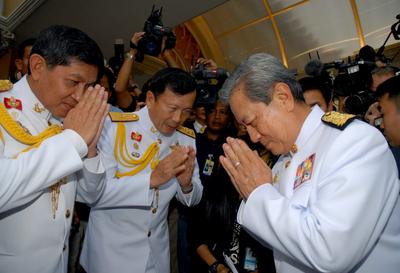And there were long worries that a coup — judicial, military or bureaucratic — would end Thailand’s flirtation with representative democracy.
Thailand has failed to build a stable consensus about how to distribute political and economic power. And powerful interests, including in the palace and the army, don’t respect electoral mandates.
The royal family itself deserves some of the blame for this situation. During the twilight of King Bhumibol Adulyadej’s unprecedented 68-year reign, at a time when the institution needed to unite the people, it has taken sides in an unbecoming battle for political dominance — and democratic voices identify palace aides as their enemies. Republican attitudes, which had been largely dormant since the 1980s, are re-emerging.
If things go badly wrong, Thailand — one of the most successful societies in Asia and comfortable with its positive international and regional standing — could topple from its perch.
So what lessons should the other nine countries of ASEAN take from Thailand’s experience?
Crucially, Thailand demonstrates that there can be serious repercussions when democratic elections bring a changing of the guard. The government of deposed former prime minister Thaksin Shinawatra, the older brother of former prime minister Yingluck, which held power from 2001 until the coup of 2006, represented an uncomfortable challenge to the old order of royal, military and bureaucratic authority.
Thaksin’s interpretation of Thai politics was brash, economically boastful and wildly popular. The army and the palace couldn’t accept the prestige that Thaksin accumulated, or the way he so profitably blurred the boundaries between business and politics.
Thaksin threatened to comprehensively displace those he consistently defeated at the ballot box. The coup of 19 September 2006 was the response to his electoral success and the years since have witnessed the tough struggle to re-define Thai democracy.
Thaksin’s allies still win every election, most recently in February 2014, though it is fair to judge that neither side is unblemished.
This is a profound issue for democrats across Southeast Asia — the nature of elite interests means that those who win elections often hold fundamentally undemocratic perspectives. Even though Thaksin has led political parties and a social movement that are emboldened by support from the masses, and partly by the rhetoric of social inclusion and economic redistribution, his primary focus remains the accumulation of power.
The Thai conundrum also has its own international dimension, especially at a time of ambitious integration across ASEAN. The ASEAN Economic Community will be implemented in 2015 and Thailand has been a strong supporter of these integrative efforts. It is one of the societies best-prepared to deal with greater intra-regional mobility. The country, for instance, already absorbs around two million migrant workers from Myanmar. Its economy is flexible, nimble and globally connected. It could see a new economic boom once the ASEAN efforts bear fruit.
But Thailand’s current internal preoccupations ensure that it is vulnerable to intrigue. At one level, lax law enforcement has made it a hub for regional smuggling: in people, weapons and even fake documents. Its sophisticated twenty-first century economy is almost fully tied to global markets but it is also saturated by criminal activities. Regulation is politicised by partisan and sectoral priorities.
That is not a formula for long-term success.
On another level, Thailand is subject to profound geopolitical shifts. Competition between China and the United States has a Thai nexus, with both countries claiming precedence and seeking to carve out new areas for dominance. In the long term there may not be room for everyone, no matter how adept Thai diplomats tend to be.
For now, at an awkward moment at the end of King Bhumibol Adulyadej’s reign, defence of the monarchy has become the over-riding concern in Thailand. And the primacy of this one institution has parallels across the region. Myanmar’s military, Malaysian ethno-elites and Indonesia’s plutocrats all face the prospect of internet-inspired mobilisations, even insurrections, and are looking at Thailand’s quagmire with concern.
At the regional level, it is true that Southeast Asia has developed an array of institutions to manage international conflicts, offering the peoples of the region some confidence that a major regional inter-state war is unlikely. But the mechanisms for the management of internal feuds are as basic as ever.
The reality is that many people want major change to their national politics. Yet still the idea that entrenched elites will surrender much power is wrong almost everywhere.
Since the retreat of colonialism, the entrenchment of powerful local elites has been the dominant Southeast Asian political characteristic. It just so happens that in Thailand a new elite, spearheaded by Thaksin, rose to challenge for supremacy.
In this case the old guard have decided that they can’t go without a fight and General Prayuth’s junta has already made its agenda clear with a rolling crackdown against dissidents, academics and independent media.
If Thailand ends badly then all of Southeast Asia will be faced with tough decisions about how political institutions, both national and regional, need to be rethought.
Nicholas Farrelly is Research Fellow in the School of International, Political and Strategic Studies at The Australian National University. This article is digested from a longer piece in the latest EAFQ.


Surely there is an important aspect which you have not mentioned. This is the fact that the Thai government set up a very expensive scheme for guaranteeing prices to farmers under the political justification of food security. Such schemes tend to involve massive distortions, massive wastage and
massive distributional effects. The distributional effects tend to be undesirable. (running mostly from poor to rich rather than the other way).
This must have been a factor in generating so much political opposition.
Do you think it was (and is) the case that there were not enough peaceful ways to create good public transparency about the scheme and to guarantee tolerance of thorough and public legal, economic and financial analysis of the scheme. Is this a factor in the political conflict?